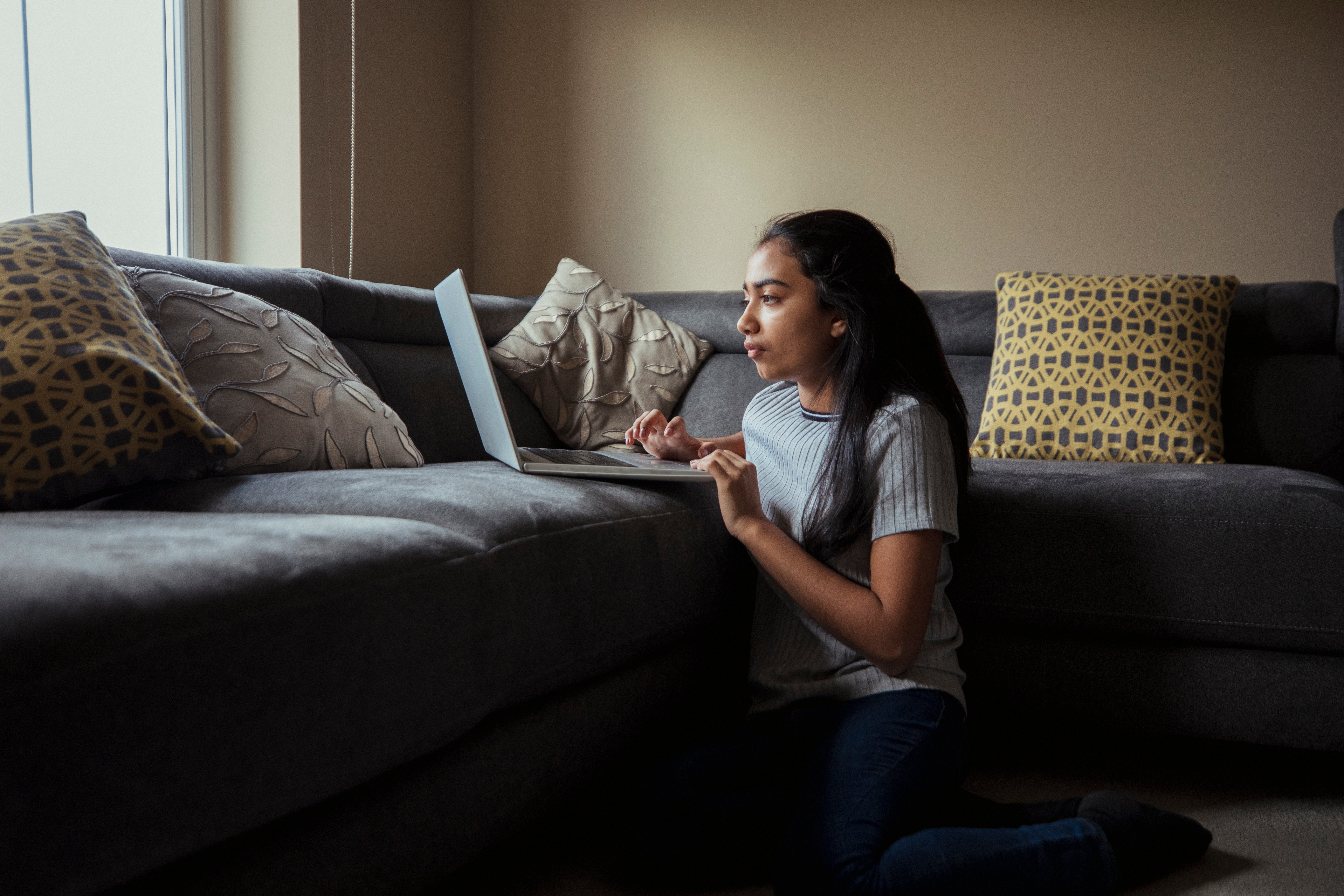The Independent's journalism is supported by our readers. When you purchase through links on our site, we may earn commission.
‘I feel forgotten’: How the digital divide is stopping children learning
As a third lockdown in England means schools are closed again, behavioural scientist, Dr Pragya Agarwal, looks at how a lack of technology is cutting children off


“I feel like I have been forgotten completely”. A single mother from Shropshire, with three children between the ages of one and 12, is explaining to me how she is attempting to home school her two eldest children during the most recent lockdown in England. The woman, who is currently unemployed and wants to remain anonymous, does not have a home computer and instead is relying on her mobile phone, the only one the family has, to access online learning.
As if that weren’t testing enough, the already difficult situation will be made worse when the mobile data runs out. She is concerned that before the end of the month they will have no internet access at all. It is a desperate situation. The children’s primary school has been unable to find her a computer, even after numerous pleas. They too are struggling with a lack of adequate resources and funding.
In June 2020, education secretary Gavin Williamson promised that the government was “on schedule” to distribute 230,000 computers over the coming month to vulnerable and disadvantaged pupils. But later reports found the department had failed to do that, only reaching 80 per cent of students (and even if the 100 per cent had been delivered, schools have said they were not allocated enough in the first place).
The government again promised more devices in December, but as students returned to in-person learning at the end of 2020, the spotlight moved away from the issue. Now - back in lockdown - all lessons are once again either being taught on video calls or at least require access to downloadable resources. Although Mr Williamson has said students without access are permitted to attend school, for many parents that is not an option. And, rather than addressing digital poverty, shifts the government’s responsibility, hoping the schools will pick up the pieces.
The gap between haves and have-nots has clearly widened considerably in the last year with many suffering job losses, furlough, or pay cuts in one of the worst recessions in recent history. One of the gaps not often discussed is the digital divide. Digital exclusion is a global issue, but if we look closer to home, we will see that this is a crisis for us here in the UK.
Nine million people in the UK are digitally excluded with no or limited access to the internet
Not just work and learning, lockdown has meant that internet access has become crucial for ordering food for the vulnerable, for accessing entertainment, speaking to family and friends, for accessing local GP appointments, ordering prescriptions, or even getting the latest news. It has never been more crucial than now to have access to digital devices and broadband.
We presume that digital exclusion primarily happens because of a lack of skills and affects mainly older people. But lockdown has shown clearly how it impacts people across the generations. Data from the Office for National Statistics (ONS) published in 2019 tells us around 60,000 children aged 11 to 18 in the UK do not have internet connectivity in their home, and around 700,000 do not have a computer, laptop, tablet or iPad at home. Now these children are struggling to keep up with their education, falling even further behind.
The link between poverty and digital access is very clear. According to University of Cambridge researchers, 51 per cent of households earning between £6000-10,000 had home internet access compared with 99 per cent of households with an income of over £40,001 having access.
And the north-south divide is a problem here too. The Lloyds’ Consumer Digital Index in 2020 found that nine million people in the UK are digitally excluded with no or limited access to the internet. Of these people, 40 per cent are based in northern England. The digital inclusion charity, Good Things Foundation, found 18 per cent of residents in the north east are able to use the internet fully, compared to 49 per cent in the south east.
A family with four children that I spoke to in Liverpool, was struggling to continue paying for the WIFI and mobile data plan alongside other household bills. Choices had to be made between food for the children and internet access. They were also sharing one basic computer, each of them trying to access resources and online learning at the same time. Hardly a long-term fix.
Many of these stories are heartbreaking and I worry about the children’s mental health. Not having access to broadband and a device is not only crucial for their learning but also for communicating and connecting with friends and peers, for keeping up with skills or hobbies that give them most comfort, and for escaping some of the anxieties and uncertainties at home.
Without access, these families fall between the cracks with nowhere to turn
As a result I decided to start a campaign, as part of my research think tank ‘50 Percent Project’, to connect people who are struggling with spare devices. Within a couple of days, I have connected 10 families and teenagers with different sorts of devices. It does not sound much, but for every story there is a sigh of relief at finally someone listening to them and not being constrained by geographical limits or having to jump through various hoops to prove the need.
Without access, these families fall between the cracks with nowhere to turn. Even something as basic as completing online forms is impossible without digital access. Many of these people did not know where to go, who to ask, how to access the resources. There is an internalised shame which can prevent some people from openly asking for help. No one wants to be the only one who is struggling, or be the parent not be able to provide for their children.
If digital exclusion is not addressed urgently, we are leaving already disadvantaged children even further behind. A computer, ipad, or tablet for every child has to be our goal.
If you have a spare device, or if you are struggling without one, do get in touch with me via DM on Twitter @DrPragyaAgarwal
Join our commenting forum
Join thought-provoking conversations, follow other Independent readers and see their replies
Comments

Bookmark popover
Removed from bookmarks